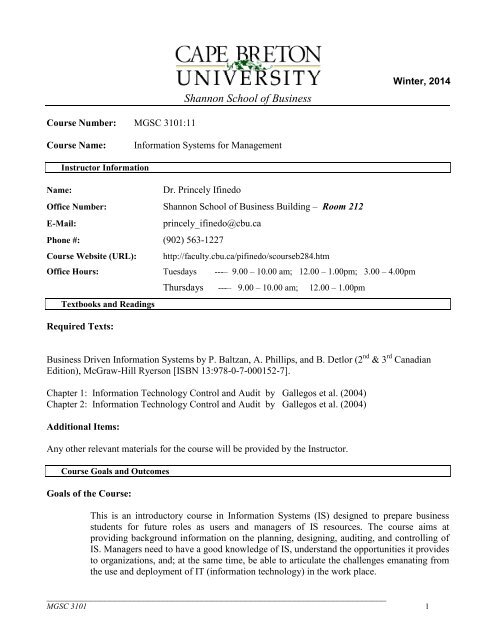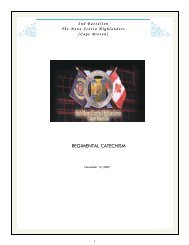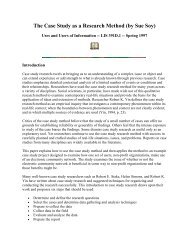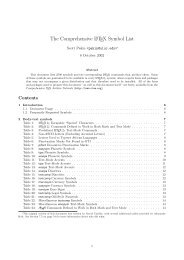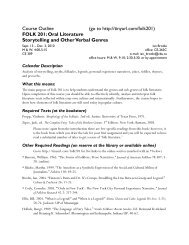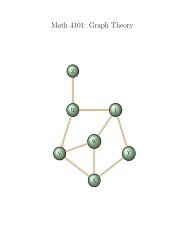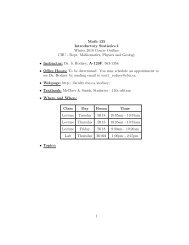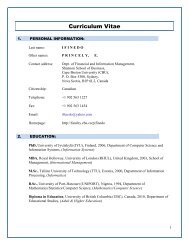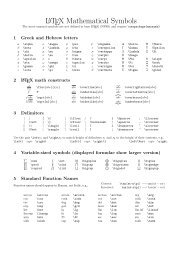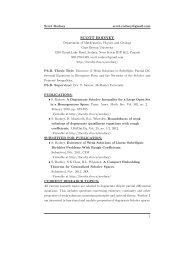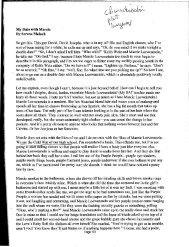Course Outline ( MGSC 3101 ) - Faculty Web Pages
Course Outline ( MGSC 3101 ) - Faculty Web Pages
Course Outline ( MGSC 3101 ) - Faculty Web Pages
You also want an ePaper? Increase the reach of your titles
YUMPU automatically turns print PDFs into web optimized ePapers that Google loves.
Shannon School of Business<br />
Winter, 2014<br />
<strong>Course</strong> Number: <strong>MGSC</strong> <strong>3101</strong>:11<br />
<strong>Course</strong> Name:<br />
Information Systems for Management<br />
Instructor Information<br />
Name:<br />
Dr. Princely Ifinedo<br />
Office Number: Shannon School of Business Building – Room 212<br />
E-Mail:<br />
princely_ifinedo@cbu.ca<br />
Phone #: (902) 563-1227<br />
<strong>Course</strong> <strong>Web</strong>site (URL): http://faculty.cbu.ca/pifinedo/scourseb284.htm<br />
Office Hours: Tuesdays ---– 9.00 – 10.00 am; 12.00 – 1.00pm; 3.00 – 4.00pm<br />
Thursdays ---– 9.00 – 10.00 am; 12.00 – 1.00pm<br />
Textbooks and Readings<br />
Required Texts:<br />
Business Driven Information Systems by P. Baltzan, A. Phillips, and B. Detlor (2 nd & 3 rd Canadian<br />
Edition), McGraw-Hill Ryerson [ISBN 13:978-0-7-000152-7].<br />
Chapter 1: Information Technology Control and Audit by Gallegos et al. (2004)<br />
Chapter 2: Information Technology Control and Audit by Gallegos et al. (2004)<br />
Additional Items:<br />
Any other relevant materials for the course will be provided by the Instructor.<br />
<strong>Course</strong> Goals and Outcomes<br />
Goals of the <strong>Course</strong>:<br />
This is an introductory course in Information Systems (IS) designed to prepare business<br />
students for future roles as users and managers of IS resources. The course aims at<br />
providing background information on the planning, designing, auditing, and controlling of<br />
IS. Managers need to have a good knowledge of IS, understand the opportunities it provides<br />
to organizations, and; at the same time, be able to articulate the challenges emanating from<br />
the use and deployment of IT (information technology) in the work place.<br />
______________________________________________________________________<br />
<strong>MGSC</strong> <strong>3101</strong> 1
Basic IS skills is becoming more and more relevant for managers in our increasingly<br />
globalized world. More importantly, computers and other communications networks<br />
continue to reshape the business landscape. Thus, there is a need to keep managers,<br />
accountants, business analysts, and so forth informed about the roles of IS in modern<br />
organization rather than leave such critical knowledge in the hands of computer systems<br />
professionals. To that end, this course will provide a broad, conceptual, and managementoriented<br />
approach to the subject by focusing on the role of IS/IT in the management and<br />
control of organizational resources.<br />
Learning Outcomes:<br />
1. Become familiar with the strategic advantages of information systems (IS) for business<br />
2. Grasp the impact of IS on organizational actors (e.g. employees, managers) and business<br />
partners (e.g. suppliers and customers)<br />
3. Become aware of how IS can help organization’s decision making and business processes<br />
4. Gain exposure to e-business applications and other emerging technologies<br />
5. Know how to manage the procurement and development of IS in organizations<br />
6. Acquire relevant insights about IS ethics, privacy, and security issues<br />
<strong>Course</strong> <strong>Outline</strong>/Schedule<br />
Tentative <strong>Course</strong> Schedule:<br />
Week of Topic Text<br />
Jan 6 Introduction & Information Systems and Business Strategy Ch. 1<br />
Jan 13 Decision Making and Business Processes Ch. 2<br />
Jan 20 The Internet and E-business Ch. 3<br />
Jan 27 Enterprise Computing Challenges and Enterprise Resource Ch. 4<br />
Planning<br />
Feb 3 Mid term<br />
Feb 10 Information Technology Control and Audit 1 - Gallegos et al. Provided in Class<br />
(2004)<br />
Feb 17 Reading Week<br />
Feb 24 Information Technology Control and Audit 2 - Gallegos et al. Provided in Class<br />
(2004)<br />
Mar 3 Databases and Data Warehouses Ch. 7<br />
Mar 10 Information Ethics, Privacy, and Security Ch. 9<br />
Mar 17 System Development and Project Management Ch.10<br />
Mar 24 Final Test<br />
Mar 31<br />
Note: The weekly schedule may vary. Any changes will be communicated on time.<br />
Weekly Case Preparation for Class Discussion:<br />
Week of<br />
Case<br />
Jan 6 The World is Flat – Friedman (Ch.1, p 27)<br />
Jan 13 Improving Business Processes at UK’s Woburn Safari Park (Ch 2, p 60)<br />
Jan 20 The Rise and Fall of Canadian Tire’s <strong>Web</strong> Site Ordering (Ch.3, p 98)<br />
______________________________________________________________________<br />
<strong>MGSC</strong> <strong>3101</strong> 2
Mar 3 Scouting for Quality (Ch 7, pp 226 - 227)<br />
Mar 10 WestJet Accepts Blame for Spying on Air Canada Rival (Ch 9, pp 294 -295)<br />
Mar 17 HP’s Software Problems (Ch. 9, pp 326- 327) &Staying on Track - Toronto Transit (Ch. 9, pp 328- 329)<br />
Evaluation<br />
Class participation 5%<br />
Assignments 20%<br />
Mid-term test 25%<br />
Final exam 50%<br />
Note: The participation rubric on which the course participation is assessed is provided below.<br />
Adapted from Vol. 19, No. 3 of The Teaching Professor with permission from the contributor, Adam Chapnick, University of<br />
Toronto (a.chapnick@utoronto.ca).<br />
A+ = 10/10 A = 9/10 B = 7 - 8 /10 C = 5 - 6/10 D = 3 - 4/10 F = 0 – 2/10<br />
- actively supports,<br />
engages, and listens<br />
to peers (ongoing)<br />
-arrives fully<br />
prepared for every<br />
session<br />
-plays an active role<br />
in discussions<br />
(ongoing)<br />
-comments advance<br />
the level and depth<br />
of the dialogue<br />
(consistently)<br />
-group dynamic and<br />
level of discussion<br />
are consistently<br />
better because of the<br />
student’s presence<br />
-actively supports,<br />
engages, and listens<br />
to peers (ongoing)<br />
-arrives fully<br />
prepared at almost<br />
every session<br />
- plays an active role<br />
in discussion<br />
(ongoing)<br />
-comments often<br />
advance the level and<br />
depth of the dialogue<br />
- group dynamic and<br />
level of discussion<br />
are often better<br />
because of the<br />
student’s presence<br />
-makes a sincere effort<br />
to interact with peers<br />
(ongoing)<br />
- arrives mostly, if not<br />
fully, prepared<br />
(ongoing)<br />
-participates<br />
constructively (adding<br />
to the discussion not<br />
just agreeing with what<br />
others say) in<br />
discussions (ongoing)<br />
-makes relative<br />
comments based on the<br />
assigned material<br />
(ongoing)<br />
- group dynamic and<br />
level of discussion are<br />
occasionally better<br />
(never worse) because<br />
of the student’s presence<br />
-limited<br />
interaction with<br />
peers<br />
-preparation and<br />
participation are<br />
both inconsistent<br />
-when prepared,<br />
participates<br />
constructively in<br />
discussions and<br />
makes relevant<br />
comments based<br />
on assigned<br />
material<br />
-group dynamic<br />
and level of<br />
discussion are not<br />
affected<br />
(negatively or<br />
positively) by the<br />
student’s presence<br />
-virtually no<br />
interaction with<br />
peers<br />
-rarely prepared<br />
-rarely<br />
participates<br />
-comments are<br />
generally vague<br />
and not drawn<br />
from the assigned<br />
material<br />
-sometimes<br />
demonstrates a<br />
noticeable lack of<br />
interest<br />
- group dynamic<br />
and level of<br />
discussion are<br />
affected<br />
negatively by the<br />
student’s presence<br />
-no interaction<br />
with peers<br />
-never prepared<br />
-never participates<br />
-demonstrates a<br />
noticeable lack of<br />
interest in the<br />
material<br />
-student’s presence<br />
has a significant<br />
negative impact<br />
on group dynamic<br />
and level of<br />
discussion<br />
______________________________________________________________________<br />
<strong>MGSC</strong> <strong>3101</strong> 3
Class Policy<br />
<br />
<br />
<br />
<br />
<br />
<br />
<br />
Please make sure that your cell phone does not disturb the class.<br />
Cell phones, electronic translators, and similar devices are not permitted during the exams.<br />
Students are expected to read the assigned readings and be prepared for class discussions.<br />
Please ensure that all class assignments and exercises are submitted on or before the due dates.<br />
There will be no make-up mid-term test (i.e. Students must take the test at the assigned time).<br />
There will be no make-up final exam (i.e. Students must take the exam at the assigned time).<br />
There will be no supplementary final exam (Please don’t ask to have an alternate time for<br />
<strong>MGSC</strong> <strong>3101</strong> tests and exam).<br />
Accommodating students<br />
Students who may require special accommodation should inform the Instructor of the type of accommodation<br />
required at the beginning of the course. For example, if you have a conflict with the tests and exam<br />
schedules, please endeavor to discuss such concerns early with the Instructor.<br />
Student Use of Technological Devices in the Classroom<br />
Refer to CBU policy regarding use of technological devices in the classroom.<br />
Academic Dishonesty<br />
Refer to CBU Plagiarism policy and regulations regarding other forms of academic dishonesty<br />
Intellectual Property (pending)<br />
Refer to CBU policy regarding Intellectual Property (pending)<br />
Inclement Weather Policy<br />
Refer to CBU’s Inclement Weather Policy (see http://www.cbu.ca/pdfs/3-1-Weather.pdf)<br />
Additional Information for the Class<br />
Prepare your assignments with a cover sheet, page numbers, student name, ID assignment number, and<br />
date.<br />
Please use 12 pt Times New Roman or Arial regular fonts. (Don't use double spacing). Marked or<br />
graded assignments will be returned.<br />
Note:<br />
Late assignments may not be accepted.<br />
______________________________________________________________________<br />
<strong>MGSC</strong> <strong>3101</strong> 4


